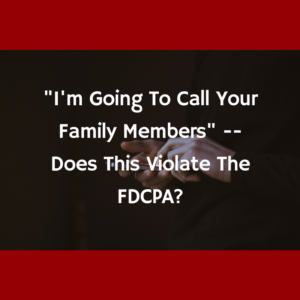“I’m Going To Call Your Family Members” — Does This Violate The FDCPA?
“I’m Going To Call Your Family Members” — Does This Violate The FDCPA?
 Yes it does. We have a case right now against a major debt collector who not only told our client this over the phone, not only told her this in a voice mail, but also told our client’s boss and family members the same thing.
Yes it does. We have a case right now against a major debt collector who not only told our client this over the phone, not only told her this in a voice mail, but also told our client’s boss and family members the same thing.
This is one of the worst types of violations of the Fair Debt Collection Practices Act (FDCPA). This type of bad conduct is designed to do one thing:
Put enormous pressure on you to pay the debt (whether you owe it or not) by extortion — if you don’t pay your family will be told.
It is remarkable when we sue companies for this — and this type of violation is quite common — the company or its lawyer will say:
John and Stan — so what that we called your client’s family members — what harm is there?
Or they will say:
We didn’t actually call anyone — we just lied about doing it so there is no harm and you need to drop the case.
Here’s why both of these statements are ridiculous:
- Calling family members brings enormous mental stress and anguish.
- There is a reason we have all of these “privacy” laws for health records, financial records, etc. It is because we have a right to keep our information private under most circumstances.
- To reveal that to your mother in law or brother or whoever destroys that privacy. Now that relative looks at you differently or treats you differently.
- We have received large verdicts on this type of conduct because juries understand how damaging this can be.
“But we simply lied and didn’t actually call!”
- OK — that is better than actually calling.
- But lying violates the FDCPA.
- Certainly it is better to merely threaten to break your kneecaps than to actually break your kneecaps.
- But it is still wrong to lie and threaten to do something that is illegal.
If you stop anyone on the street and ask them if calling family members about their private financial information is “OK” or if it is fine to threaten to do this, I think almost everyone will agree that is wrong.
The defense lawyers who stand in court and argue this is no big deal change their tune if the judge asks if they want their personal financial information distributed to family members — tax returns, credit reports, debts, etc.
So yes this does violate the FDCPA and it often leads to large settlements and verdicts.
Contact Us.
If you live in Alabama and want to talk about this call us at 205-879-2447 and we’ll be happy to talk with you.
Or you can fill out a contact form and we will get in touch with you as soon as we can.
Thanks for reading, and have a great day!
Additional resources on the FDCPA:
- FAQ About Creditor Harassment
- Debt Collectors Can Only Call Friends, Neighbors, and Co-workers For “Location Information”
- Why Do Debt Collectors Call Third Parties?
- Will A Jury Really Award Money To Someone Who Owes A Collector?
- Is It Worth My Time To Sue An Abusive Debt Collector Under The FDCPA?
- If I Have Depression Or Anxiety Issues, Can I Still Receive Mental Anguish Damages Under The FDCPA Against The Debt Collector?